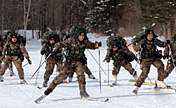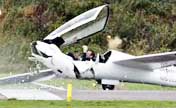

It is highly likely that Russia will stick to its stance at future strategic weapons reduction talks. But the fact is Russia can hardly stop the US from going ahead with its plan. Apart from demanding restrictions on the deployment of the European Antimissile System and seeking other nuclear powers' support, Russia does not have the bargaining chips to force the US into accepting its demand.
Major countries know that the advances made in military science and technology have made strategic stability in nuclear and non-nuclear fields highly correlated, especially during the strategic deployment process. And over-dependence on nuclear power, especially during an emergency, can undermine a country's national security.
But since other countries, compared to the US, are at a disadvantage in terms of conventional weapon systems, they have to adopt asymmetric corresponding actions. Global strategic stability depends more on the stability in Europe and Northeast Asia. This is something that the international community should understand and tell the countries that are calling for a "nuclear-free world" not to develop conventional weapons to replace nuclear ones, because it will have serous consequences on international security.
Some insightful people in the US have indeed emphasized the importance of maintaining global strategic stability. In 1967, Robert McNamara, then US secretary of defense, suggested that the former Soviet Union restrict the development of its anti-missile system to avoid escalating tensions. Initially, the Soviet Union opposed the idea but eventually it accepted it because it realized that developing the anti-missile system was destabilizing the world. This led to the 1972 Treaty on the Limitation of Anti-Ballistic Missile Systems between the Soviet Union and the US.
In 1985, when the US began experiments on how to use missiles to destroy low earth orbit satellites, many American senators and scholars said a US-Soviet Union race in this field was dangerous. Since the Soviet Union had unilaterally stopped its anti-satellite experiments in 1983, the US also gave up its tests later.
People who value peace hope that long-distance launching vehicles for precision-guided conventional warheads and missile defense systems will be part of the agenda at the strategic arms reduction talks.
 |
 Winter training on snow-capped mountains
Winter training on snow-capped mountains  Chinese navy conducts landing training
Chinese navy conducts landing training The world in photos (2013.1.28-02.03)
The world in photos (2013.1.28-02.03) French Spiderman scales Havana Libre hotel
French Spiderman scales Havana Libre hotel China's weekly story (2013.01.27-01.31)
China's weekly story (2013.01.27-01.31) Wedding planner: job that deals with 'happiness'
Wedding planner: job that deals with 'happiness'  Chinese New Year in country fair
Chinese New Year in country fair Don't follow me, I feel lost in China
Don't follow me, I feel lost in China  Oh, my god! Dangerous moments captured
Oh, my god! Dangerous moments captured  Boxing, a combination of strength and beauty
Boxing, a combination of strength and beauty  Stunning lantern show held in Changsha
Stunning lantern show held in Changsha  Modest beauties? No, they're boxers
Modest beauties? No, they're boxers  Robot pavilion opens to public at Taipei Expo Park
Robot pavilion opens to public at Taipei Expo Park  China to deepen income distribution reform
China to deepen income distribution reform Alipay shocks online spenders
Alipay shocks online spenders